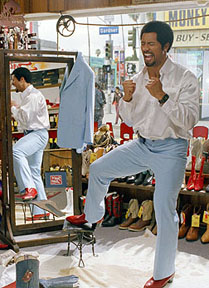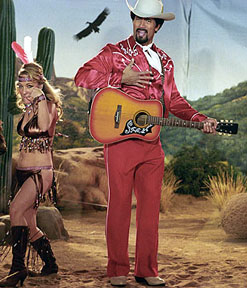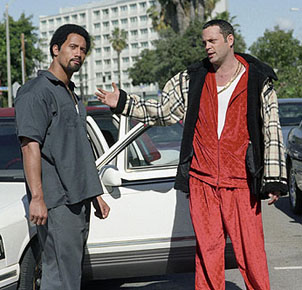 Not many tough guys would be so comfortable poking fun at their personas, but The Rock goes all out. In Be Cool, he lets himself get beaten up, he plays his trademark eyebrow gesture as a ridiculous mockery, and he plays gay. He commits to it with no fear, and ends up adding depth to his tough guy image.
Not many tough guys would be so comfortable poking fun at their personas, but The Rock goes all out. In Be Cool, he lets himself get beaten up, he plays his trademark eyebrow gesture as a ridiculous mockery, and he plays gay. He commits to it with no fear, and ends up adding depth to his tough guy image.
It may sound like this is a highly controversial role and The Rock would be dodgy to talk about it in interviews. Not so. The Rock is proud of his departure, and he has no qualms about the gay thing, the flamboyant costumes or singing.
Rock plays Elliot Wilhelm, bodyguard to Raji, a corrupt music executive. But Elliot really wants to be a star himself, so even when he has to take on Chili to protect Raji’s assets, he hits him up for an audition. It’s more self-referential Elmore Leonard entertainment industry gangster satire in Be Cool.
Q: How much leeway did you have with your character, considering it’s based on a book?
Rock: Actually I had a lot of leeway and latitude with F. Gary Gray, especially with a character like this, where we were starting from scratch basically, and although Elliot was written in the novel by Elmore, still nonetheless, we had to start from scratch. In terms of drawing from things in my own life, I connected with Elliott. Here’s this aspiring actor — that was me five years ago, probably about the time where I met a lot of you guys. And this is a guy who doesn’t have any money — that was me eight years ago. I was lucky in my life because I had a lot of positive gay influences, and my mentor for many, many, many years is a strong, proud, steadfast, truthful gay man, who by the way I’ve literally seen kick a lot of people’s asses. And I say that not that he was a violent man, but he was a former professional wrestler.
Q. Who is he?
Rock: His name is Pat Patterson.
Q: What was it like working with Travolta and letting him take you down?
Rock: Well, John is great. As you guys know, John is such a warm guy. He’s very very supportive. I obviously had never worked with John before, nor had I met him. I met him at rehearsals. He was so kind and supportive then. You know here this iconic legend and working with him was a thrill and a pleasure for me. And it’s interesting how quickly he was able to take me down too. When I saw a cut of the movie it’s like [whoosh] and I’m just down. But John was absolutely great. John was fantastic.
Q: Do Chili’s moves work?
Rock: Yeah, absolutely. You can paralyze somebody when you strike them correctly at the correct place and point in their neck. So and that was one of the first moves that he did, but he actually took it easy on me so my character wasn’t paralyzed. So yeah, they work in a way.
Q: Was this the first time you’ve used guns in a movie?
Rock: I used a gun in Rundown. It wasn’t until the end of the movie that I actually find the gun, and in Walking Tall he used a gun. So yeah.
Q: Are you comfortable with them?
Rock: I feel comfortable with guns. I’ve had guns in the past, so the good thing is that on movies, on the set you have advisors and people who are well versed at using guns who are always there to help you, to make sure that the safety’s right and you’re using them correctly.
Q: Had you ever sung before?
 Rock: No, I’ve never sung before, certainly not in movies. I drive my family and my friends crazy every time I think I’m going to win a Grammy or something like that, but the as far as for this song, that was another way of trying to think, and I sat down with Gary, “Well, how can we make Elliott more interesting?” I told
Rock: No, I’ve never sung before, certainly not in movies. I drive my family and my friends crazy every time I think I’m going to win a Grammy or something like that, but the as far as for this song, that was another way of trying to think, and I sat down with Gary, “Well, how can we make Elliott more interesting?” I told
Q: What was that dance you do at the end?
Rock: Again, Elliott is now completely out and free and living his dream on stage for millions of people. He would do his customary Samoan slap dance. I called my cousins from
Q: That’s an authentic Samoan dance?
Rock: Yeah, absolutely. I was so excited to showcase that, for that to be a big part of the character’s growth. At the end of the movie, he’s out and he’s free. He’s this proud, gay man who now is on the cusp of living his dreams and he’s on stage performing in front of millions of people. To break out in that dance was awesome.
Q: Are you worried about your fans’ reaction to you playing a gay character, and a stupid character?
Rock: Number one, I think the audience that I have and my fans — no, I think they’re going to be very supportive because at the end of the day I have always wanted to entertain, and I think they would just appreciate [my] taking on the role. And as far as being stupid, I’ve got to disagree with you. I don’t think Elliot is a stupid man. I think he’s an earnest man who’s genuine. And by the way, I’m sure you guys have come in contact with them. That’s the reality of
Q: Do you anticipate any criticism from the gay community?
Rock: Well, I’ll tell you. I hope I don’t because it was important to me from the get-go because I didn’t want to turn anything really into a mockery or Saturday Night Live skit, but try and play it as straight as I possibly could, no pun intended, and again it goes back to my ideology. In my interpretation of what being what a gay man is, and the strength of that, so again, bringing that over to Elliot, so no. The temperature that I’m reading from the gay community and the gauge from the gay community has all been very, very positive. So hopefully, it will stay that way. But my intent was just to play a guy who wanted to make it and whom I could connect with, and not only that, but he just happened to be gay. And if you didn’t like it, he’d be happy to kick somebody’s ass.
Q: What similarities are there between the music and wrestling worlds?
Rock: I think there’s a lot of similarities. I think over-all the entertainment industry, period. There’s a seedy underbelly to the wrestling world, the movie business, to the music business as well. I wasn’t that familiar with the music business, or at least that side of it. Speaking to John Travolta over the months of us filming, as well as Andre, knowing a lot of musicians, it’s a pretty accurate depiction of what goes on. We made it funny, we poked fun at it, but the reality of it is true.
Q. Are you saying goodbye to the eyebrow thing forever?
Rock: No. That was one of the great things to me too. I love self-deprecating humor, I’ve always been a big fan of that, and to have that joke run through the movie, “Look, I’ve got talent! How can you not see this?” I thought that was a great joke too. But no, if there’s another creative way to throw that in there to make fun of myself, sure.
Q: Since most of your scenes are with him, what was it like working with Vince Vaughn?
 Rock: Vince was great to work with, and I’ve known Vince for a little while now. We had talked about doing something together, and we had this opportunity. You don’t quite know, especially with two crazy characters like this, with Elliot, and he’s a bad ass during the day and a gay man at night — not a gay man at night, but in his private time he likes to put on the blue outfit, the cowboy outfit, with the red boots — and Vince Vaughn, who is one of the few actors in Hollywood who is taller than I am — he’s all of six five, and looking up at him, he’s this Jewish character, dressing like a pimp, walking black, talking black, and so funny. And
Rock: Vince was great to work with, and I’ve known Vince for a little while now. We had talked about doing something together, and we had this opportunity. You don’t quite know, especially with two crazy characters like this, with Elliot, and he’s a bad ass during the day and a gay man at night — not a gay man at night, but in his private time he likes to put on the blue outfit, the cowboy outfit, with the red boots — and Vince Vaughn, who is one of the few actors in Hollywood who is taller than I am — he’s all of six five, and looking up at him, he’s this Jewish character, dressing like a pimp, walking black, talking black, and so funny. And
Q: Will you ever forgive F. Gary Gray for Punk’d?
Rock: [Laughs] I’ll never forgive that Gary Gray for Punk’d and one day I’m going to get him back. I mean that in a loving way. What happened on Punk’d, if you guys didn’t see, F. Gary Gray and everyone was involved in blowing up my trailer. It was actually a great punk, but what happened is that it almost escalated into a big brawl. Because it reached the point where there was a cop here and I wound up like shoving the cop and then going after this one guy. And the cop was actually one of the actors from MTV, so once I found out I was punked I was actually really relieved. I could have been in trouble.
Q: How long did it take to grow the afro?
Rock: The Afro was a wig. I grew out my hair to probably about an inch or so and then put the Afro on. I looked good, right?
Q: How much time was spent determining your look?
Rock: There were many, many days on the look of Elliot, starting from scratch, unlike with Chili Palmer. John obviously slipped right into that role like a glove. But it was everything from how he would dress to how he would look to the earrings, wanting to show somewhat of a juxtaposition between how he looked during the day, this badass, and then his private time, what he would put on.
Q: Were you familiar with the novel?
Rock: I was familiar with Elmore’s work, for sure and the script was sent to me. I didn’t read the book. The script was sent to me and it’s interesting because the script was sent and my agent said, "Hey, you should check the script out. It’s an adaptation of an Elmore Leonard novel, and it will be the sequel to Get Shorty, and the character’s name will be Elliot . . . I think it would be fantastic. Read it." So I said okay. I’m reading it, and it says Elliott Wilhelm, age 30, aspiring actor, talented, raises one eyebrow… and gay. Okay. And I read it, and it was fantastic. Really, really well written.
Q: What stage are you in in the evolution of a movie star?
Rock: I’m not too sure. That’s a tough question because if I had a chart in front of me, then I could tell you, “Oh, maybe I’m there.” I have no idea.
Q: What about going from action to comedy and then a drama next?
Rock: Oh, like that. I would love to. I’m actually doing an inspirational drama this summer. I’m going to do that and I just got off another action movie, Doom, which will be out in the summer. So if that’s what you’re talking about in terms of the evolution, then I’d like to continue to do all genres in movies.
Q: Tell us about those upcoming movies?
Rock: Doom is a video game adaptation that’s basically like a sci-fi horror and it has a great writer, John Wells, who of course you guys know. I’m very excited about that and the writing is great. It’s with Universal. The drama is called Gridiron Gang and it’s going to be with Sony and it’s a true story. It takes place in a teenage prison camp and one man changing, literally transforming all these kids’ lives. It’s really, really incredible. It takes place up in